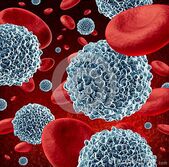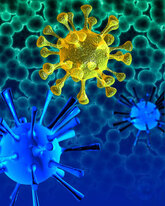How your body fights infections
Your immune system is your body's main defense. Cells, tissues, and organs that work together to protect your body from infections and diseases. Your body makes around a billion cells everyday, If an infection enters the body, your body will try to get rid of it before it reproduces. Your immune system is made up of a host of organs along with mucus, saliva enzymes, and stomach acid that work to fight infection as it enters the body. Your bone marrow and thymus make lymphocytes and white blood cells that attack the infection. The spleen, tonsils, lymph nodes, hormones, and mucus membranes of the digestive system are also part of the immune system that releases antibodies to kill the infection. More than half of all antibodies produced by the body are in the bowel wall, particularly the small bowel and appendix.
What is an infection
|
An infection is when and organism; bacteria, viruses, yeast, fungi, protozoa or other microorganism, make it's way inside the body and reproduces inside the body, sometimes spreading. You can get an infection by eating rotten food or if you have a cut and your body let in bacteria. Signs of an infection can be high fever, malaise, headache, or rash. Infections can be spread through water, blood, food, or skin contact. The immune system is the bodies natural defense against infections and usually can take on most foreign agents. Viruses are smaller than bacteria and they can take over cells where as bacteria needs a host cell. There are millions of viruses but only about 5000 that have been identified. Viruses can also lay dormant in the body before replicating again. At risk populations; young, old, pregnant or immune compromised are more vulnerable. Antibiotics are not effective against viruses and most remedies just relieve symptoms while your immune system works to fight off the virus. (White and Falck)
|
Signs that you might have an infection
|
1. Unexplained weight loss or changes in bowels. Losing weight without trying is a serious medical issue. If you you lost more 10 percent of your body weight, consult a doctor, it could mean a serious infection. Black or bloody stools, diarrhea or constipation that persists, or stomach pain are all issues of concern.
2. Constant high fever. A fever over 103 for more than three days straight, can mean urinary tract infection, or tuberculosis or another kind of infection. 3. Confusion or personality changes. Poor thinking skills, difficulty paying attention, or behavioral changes. could mean an infection, poor nutrition, or mental health problem. if this happens consult a doctor. 4. Shortness of Breath. If it comes on suddenly and is severe, seek medical attention. |
NUTRIENT SUPPORT FOR THE IMMUNE SYSTEM
BELL PEPPERS
LEAFY VEGETABLES
Cabbage, Collard Greens, Kale, Pak Choy, Spinach
Kiwi
OATS
pumpkin and squash

There are simple ways to prevent from getting infections, including; washing your hands for at least 20 seconds under warm water, covering your mouth when you sneeze or cough. and if you are sick wear a mask or stay home.
sources
Brain, Marshall. “How Your Immune System Works | HowStuffWorks.” Health | HowStuffWorks, 11 February 2021, https://health.howstuffworks.com/human-body/systems/immune/immune-system.htm. Accessed 5 August 2022.
Deegan, Donna. “What Is an Infection? | CDCF PCI.” Preventing Infections in Cancer Patients, https://www.preventcancerinfections.org/health-tip-sheet/what-infection. Accessed 19 November 2022.
“Definition of infection - NCI Dictionary of Cancer Terms - NCI.” National Cancer Institute, https://www.cancer.gov/publications/dictionaries/cancer-terms/def/infection. Accessed 18 November 2021.
Georgiev, Deyan. “How does the Human Body Fight Infections? (with pictures).” The Health Board, 7 November 2022, https://www.thehealthboard.com/how-does-the-human-body-fight-infections.htm. Accessed 18 November 2022.
“How Infection Works, How Pathogens Make Us Sick — The National Academies.” The National Academies, http://needtoknow.nas.edu/id/infection/how-pathogens-make-us-sick/. Accessed 8 February 2022.
Washington, Ali. “10 Antibacterial Foods to Fight Infection Naturally.” Young and Raw, https://www.youngandraw.com/10-antibacterial-foods-to-fight-infection-naturally/. Accessed 21 September 2022.
“What are the organs of the immune system? - InformedHealth.org.” NCBI, IQWiG, 30 July 2020, https://www.ncbi.nlm.nih.gov/books/NBK279395/. Accessed 19 November 2022.
White, Cameron, and Suzanne Falck. “Infection: Types, causes, and differences.” Medical News Today, 30 March 2020, https://www.medicalnewstoday.com/articles/196271#types. Accessed 16 November 2021.
Deegan, Donna. “What Is an Infection? | CDCF PCI.” Preventing Infections in Cancer Patients, https://www.preventcancerinfections.org/health-tip-sheet/what-infection. Accessed 19 November 2022.
“Definition of infection - NCI Dictionary of Cancer Terms - NCI.” National Cancer Institute, https://www.cancer.gov/publications/dictionaries/cancer-terms/def/infection. Accessed 18 November 2021.
Georgiev, Deyan. “How does the Human Body Fight Infections? (with pictures).” The Health Board, 7 November 2022, https://www.thehealthboard.com/how-does-the-human-body-fight-infections.htm. Accessed 18 November 2022.
“How Infection Works, How Pathogens Make Us Sick — The National Academies.” The National Academies, http://needtoknow.nas.edu/id/infection/how-pathogens-make-us-sick/. Accessed 8 February 2022.
Washington, Ali. “10 Antibacterial Foods to Fight Infection Naturally.” Young and Raw, https://www.youngandraw.com/10-antibacterial-foods-to-fight-infection-naturally/. Accessed 21 September 2022.
“What are the organs of the immune system? - InformedHealth.org.” NCBI, IQWiG, 30 July 2020, https://www.ncbi.nlm.nih.gov/books/NBK279395/. Accessed 19 November 2022.
White, Cameron, and Suzanne Falck. “Infection: Types, causes, and differences.” Medical News Today, 30 March 2020, https://www.medicalnewstoday.com/articles/196271#types. Accessed 16 November 2021.





